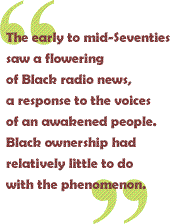 In
1973, 21 reporters from three Black-oriented radio stations
provided African Americans in Washington, DC a daily diet
of news - hard, factual information vital to the material
and political fortunes of the local community. The three stations
- WOL-AM, WOOK-AM and WHUR-FM - their news staffs as fiercely
competitive as their disc jockeys, vied for domination of
the Black Washington market. Community activists and institutions
demanded, expected, and received intense and sustained coverage
of the fullest range of their activities.
In
1973, 21 reporters from three Black-oriented radio stations
provided African Americans in Washington, DC a daily diet
of news - hard, factual information vital to the material
and political fortunes of the local community. The three stations
- WOL-AM, WOOK-AM and WHUR-FM - their news staffs as fiercely
competitive as their disc jockeys, vied for domination of
the Black Washington market. Community activists and institutions
demanded, expected, and received intense and sustained coverage
of the fullest range of their activities.
On
the streets and at press conferences, Black radio journalists
jostled with white and African American reporters from "general
market" radio stations, to form a local press corps that
competed for the Black public's attention and respect. Movements
sprouted, thrived - or self-destructed - in a marketplace
of contentious community and media voices. Black radio news
had been called forth by the Civil Rights and Black Power
movements of the previous decade. The news staffs at WOL (five
reporters), WOOK (four-person news staff) and WHUR (12 reporters
and producers) were local radio's answer to Black people's
demands.
In
scores of large, medium and even small cities across the nation,
the early to mid-Seventies saw a flowering of Black radio
news, a response to the voices of an awakened people. Black
ownership had relatively little to do with the phenomenon.
According to the National
Association of Black-owned Broadcasters (NABOB), there
were only 30 African-American owned broadcast facilities in
the United States in 1976. Today, NABOB boasts 220 member
stations - and local Black radio news is near extinction.
The
guilty parties
With
some notable exceptions, Black owners are as culpable as white
corporations in the demise of Black radio news. In Washington,
DC, the culprit is obvious.
Black-oriented
radio journalism in the nation's capitol has plummeted from
21 reporters at three stations, 30 years ago, to four reporters
at two stations, today. WPGC-FM (Infinity-Viacom) fields one
reporter, and Howard University's commercially operated WHUR-FM
employs three. Black Washington's dominant radio influence
is Radio One, the 66-station
chain founded by Cathy Liggins Hughes, valued at $2 billion.
Hughes employs not a single newsperson at her four Washington
stations - a corporate policy reflected in most of the 22
cities in which Radio One operates. The chain is the dominant
influence in at least 13 of these markets. (Radio One also
programs 5 channels of XM Satellite Radio, and has launched
a Black-oriented television venture with Comcast, the cable
giant.)
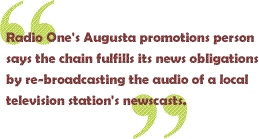 While
1,200-station Clear Channel deserves every lash of the whip
as the Great Homogenizer of American radio, the chain operates
only
49 stations programmed to Blacks, and is dominant in no
large African American market. The Queen of Black broadcasting
is Radio One, and her dictum is, Let Them Eat Talk.
While
1,200-station Clear Channel deserves every lash of the whip
as the Great Homogenizer of American radio, the chain operates
only
49 stations programmed to Blacks, and is dominant in no
large African American market. The Queen of Black broadcasting
is Radio One, and her dictum is, Let Them Eat Talk.
Radio
One's operations are roughly as devoid of news as Clear Channel's
Black-programmed stations. That certainly is the case in Detroit,
where the two chains dominate the Black airwaves: Clear Channel
owns two stations, WJLB-FM (urban contemporary) and WMXD-FM
(urban adult contemporary), while Radio One operates WDTJ-FM
("mainstream" urban), WDMK-FM (urban adult contemporary)
and WCHB-AM (talk-gospel). At all five stations, it's the
same story: no news.
Executives
at both Clear Channel and Radio One used nearly identical
language to inform  that morning radio personalities - people we used to call
disc jockeys - are responsible for "doing the news,"
which consists of items that were once called "public
service announcements" back in the days when reporters
did real news. Black Detroit has been turned into a news wasteland
through the combined operations of Clear Channel and Radio
One.
that morning radio personalities - people we used to call
disc jockeys - are responsible for "doing the news,"
which consists of items that were once called "public
service announcements" back in the days when reporters
did real news. Black Detroit has been turned into a news wasteland
through the combined operations of Clear Channel and Radio
One.
In
Augusta, Georgia, Clear Channel is a very junior partner to
Radio One in the news-eradication business. The Black chain
owns five outlets to Clear Channel's single Black station.
Clear Channel admits to having no local news department at
any of its Augusta properties. Radio One's Augusta promotions
person says the chain fulfills its news obligations by re-broadcasting
the audio of a local television station's newscasts.
In
1970, a two-person news operation at James Brown's Augusta
radio station played a central role in bringing the city into
the post-Jim Crow era. Under the slogan/logo "Truth and
Soul," WRDW-AM News provided crucial coverage of the
movement to integrate the 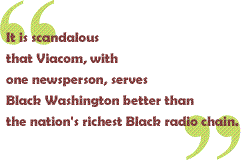 downtown
retail workforce, a campaign that led to general transformations
in local race relations. Today, Radio One's near-monopoly
has created a profitable, one-stop advertising shop for every
merchant with something to sell to Black Augusta. In return,
Radio One gives its audience music, talk, and regurgitated
television news. Black Augustans can now choose between six
stations, rather than the two Black formats available three
decades ago. But they will get no local Black news. In that,
Black Augusta is in the same boat as their brothers and sisters
in similarly sized Macon, 150 miles to the West, where Clear
Channel owns four Black stations with no local news programming.
downtown
retail workforce, a campaign that led to general transformations
in local race relations. Today, Radio One's near-monopoly
has created a profitable, one-stop advertising shop for every
merchant with something to sell to Black Augusta. In return,
Radio One gives its audience music, talk, and regurgitated
television news. Black Augustans can now choose between six
stations, rather than the two Black formats available three
decades ago. But they will get no local Black news. In that,
Black Augusta is in the same boat as their brothers and sisters
in similarly sized Macon, 150 miles to the West, where Clear
Channel owns four Black stations with no local news programming.
African
Americans in Augusta and Macon, Georgia can thank Radio One
and Clear Channel, equally, for withholding local news, without
which community organizing is just a bunch of "talk."
Black Detroit has access to many more radio signals than 30
years ago, but hears far less information that is politically
useful. The once proud Black radio press corps of Washington,
DC is now shriveled to four people at two stations, while
the corporate, four-station Radio One powerhouse dispenses
cheap talk and jive. It is scandalous that Viacom, with one
newsperson, serves Black Washington better than the nation's
richest Black radio chain.
No
news is bad news
We
have provided these snapshots of the state of Black radio
news to illustrate a larger picture. As the FCC under Colin
Powell's totally corrupted son, Michael, conspires to complete
the mega-consolidation of the nation's airwaves - possibly
this Monday - Black America surveys a broadcast landscape
in which serious political struggle has already become problematic,
if not impossible. As with all things in America, the Black
road to consolidated media mush has been different from that
of white America: Blacks supported the business ventures of
many of the very people who now electronically starve and
abuse them.
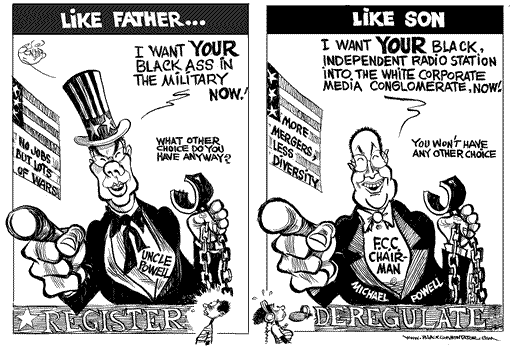
African
Americans were caught between two valid sets of demands -
Black community access to the airwaves, and Black ownership
of broadcast properties. With the enthusiastic support of
the entire Black body politic, the entrepreneurs won great
victories, increasing their properties seven-fold in the space
of a generation, and their net worths by far more than that.
They were empowered to join the game of consolidation that
began in the Eighties and reached fever pitch after passage
of the Telecommunications Act of 1996. Radio One emerged as
the pre-eminent Black market presence, with stations
in Atlanta, Baltimore, Boston, Charlotte, Cincinnati, Cleveland,
Columbus, Dallas, Dayton, Houston, Indianapolis, Los Angeles,
Louisville, Miami, Minneapolis, Philadelphia, Raleigh-Durham,
Richmond, St. Louis, as well as Washington, DC, Detroit, and
Augusta.
In
the process, Black "stand-alone" stations, typically
operated by businesspeople with longstanding roots in the
community, have been forced out - or have cashed out. News
has most often been jettisoned in favor of "talk"
- the seductive format that ranges from quality syndications
that do have value to a national audience but provide little
to sustain local struggles, to vapid, "barber shop"-type
offerings, eclectic blocks of time filled with chatter, signifying
nothing.
Dumbing
down Black people
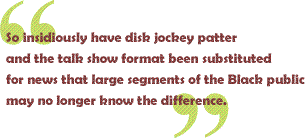
There
need not have been a contradiction between Black ownership
and community access, including the maintenance of quality
news operations. In a betrayal that, we believe, has been
a major factor in the relentless decline of Black political
power, many Black radio owners have adopted business plans
identical to their white corporate peers.
Such
is certainly the case with Radio One. "The company's
voraciousness mirrored the consolidation throughout the radio
industry after rules limiting the number of stations one company
could own nationally were lifted in 1996," wrote the
Washington Post, in a February
5, 2003 showcase article. Radio One boasts a 60-person
research department that "randomly calls thousands of
people and conducts 20-minute surveys of those who tune in
to its radio stations." Do the people want news? The
subject isn't broached by either Post reporter Krissah Williams
or her main interlocutor, Radio One Chief Operating Officer
Mary Catherine Sneed. Instead, the conversation is all about
the sales value of entertainment programming. "If you're
not [at parties, clubs and grass-roots events], you'll never
be a big personality in the community," Sneed said. "Those
are the things that separate stations from one another."
News
isn't even on the radar screen. Indeed, so insidiously have
disc jockey patter and the talk show format been substituted
for news that large segments of the Black public may no longer
know the difference.
James
E. Clingman is a serious man, an adjunct professor at the
University of Cincinnati's African-American Studies department,
former editor of the Cincinnati Herald Newspaper, and a founder
of the Greater Cincinnati African American Chamber of Commerce.
Yet Professor Clingman, who is also a veteran talk show host,
manages to write a lengthy commentary on Black radio without
once mentioning the dearth of local Black news.
"As
far as Black talk radio is concerned, we do get a variety
of opinions," said Clingman in a piece posted on BlackPressUSA.com.
"But unlike the rallying cries I hear on those other'
[white] stations, calls to action against events or persons
that rub the host the wrong way, or calls for collective political
action against an 'enemy,' much of our Black radio talk is
just talk - without action. I don't mean to use a broad brush
with that statement; I only want to sound the alarm."
Clingman continues, "Airtime is precious, and the capability
of speaking to thousands of our people via a Black talk radio
program should, at every opportunity, call for and move our
people to responsive action."
Professor
Clingman seems not to realize that Black talk radio is uninformed
radio, conversations not grounded in a steady stream of information
of the kind that can only be provided by Black news operations.
Thirty years ago, Black talk shows were forums to discuss
the news that listeners learned about largely through the
efforts of the stations' own journalists. In many cases, radio
reporters hosted these shows, turning them into larger windows
on the political ferment within and beyond the community.
Today, much of Black talk radio operates in an informational
vacuum, simulating activism through the ritual flapping of
lips.
Professor
Clingman clings to the notion that Black ownership will provide
salvation, and worries that "The next round of deregulation
could mean an even further decline in Black ownership of radio
outlets and, more importantly, a decline in Black talk radio."
His priorities are misplaced. As we have learned to our despair
and horror, Black ownership guarantees nothing and, in the
case of Radio One, ensures that entertainment, disc jockey
chatter and syndication become standard fare. Most importantly,
the absence of news operations at Black radio stations results
in atrophy of existing Black political groupings and the stillbirth
of new organizations. Talk shows do not empower communities,
vibrant grassroots organizations do. And these organizations
can only flourish when their activities are given proper coverage
in the media that their constituencies listen to - Black radio.
Misplaced
loyalties
African
Americans applauded the media acquisitions of "our"
entrepreneurs, trusting that the community at large would
benefit. Instead, many owners moved quickly to become corporate
citizens, first, last and always - or until the next crisis
threatens their holdings.

It
is impossible to measure what Black America has lost through
misplaced loyalty to owners who themselves feel no such sentiment.
Many of the gains made by African Americans during the heyday
of Black radio cannot be duplicated today, due to the duplicity
of those entrepreneurs who cashed in the people's collective
chips for their own benefit.
A
Chicagoan who was part of the small group of activists that
laid the groundwork for Harold Washington's successful 1983
mayoral campaign remembers how critical Black radio was to
the process. "Back in those days, the first thing we
would do was print out the leaflets. The next was to call
Black radio to get coverage," he says. "If we were
going to mount a campaign to elect a Harold Washington Mayor
of Chicago, today, I don't know if we could pull it off,"
given the current state of Black radio.
In
our May 1 commentary, "Treat
Corporate Media Like the Enemy," we wrote:
The
Civil Rights and Black Power Movements were mass activities
whose fortunes were closely tied to the behavior of mass
media. The frenzy of Black newsroom hiring three decades
ago occurred in response to Black activism. African Americans
demanded that media provide coverage of Black struggles,
or be considered "part of the problem." The FCC
and corporate media temporarily accommodated these demands,
allowing a brief expansion of the social space in which
the Black political drama was acted out. That door is now
virtually closed, and will remain so, no matter how the
FCC rules in June, unless Black organizations retool their
strategies to force a media response.
African
American radio audiences are the most loyal demographic in
the nation, far more likely to listen to Black radio than
Hispanics are to patronize Spanish-language outlets, and much
less segmented than the white population. Consequently, Black
radio is extremely profitable. For much the same reason, the
near-extinction of local Black radio news has crippled Black
community organizing. One can only imagine the kind of city
Washington, DC 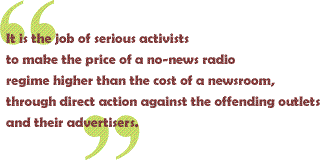 might
have become had Black radio news kept pace with the doubling
of Black-formatted outlets. Rather than dwindling to four
radio reporters from 21 in 1973, 30 or more electronic journalists
might be covering community concerns for Black-oriented stations,
cultivating an organized and aware population in the process.
might
have become had Black radio news kept pace with the doubling
of Black-formatted outlets. Rather than dwindling to four
radio reporters from 21 in 1973, 30 or more electronic journalists
might be covering community concerns for Black-oriented stations,
cultivating an organized and aware population in the process.
A
healthy, three- or four-person local newsroom can be staffed
for considerably less than $200,000 per year. Radio One dominates
the Washington market, and must bear a large measure of responsibility
for the disempowerment of the Black people of the city and
region. It is the job of serious activists to make the price
of a no-news radio regime higher than the cost of a newsroom,
through direct action against the offending outlets and their
advertisers.
To
review Clear Channel's Black-programmed stations, click here:
http://www.clearchannel.com/radio/search.php
Then, go to "station search" and enter "urban"
Radio
One station roster:
http://www.radio-one.com/map.htm
Recommended
reading:
The
Nation, May 15
FCC: Public Be Damned
by John Nichols & Robert W. McChesney
http://thenation.com/doc.mhtml?i=20030602&s=nichols
Counterpunch,
May 16
The FCC's Big Grab
Robert W. McChesney
http://www.counterpunch.org/mcchesney05162003.html
Fairness
& Accuracy in Reporting
May 20 Action Alert:
Will the FCC Help Big Media Get Even Bigger?
http://www.fair.org/activism/fcc0305.html


